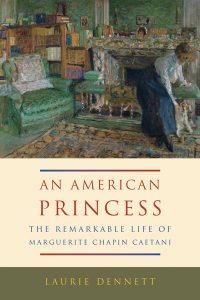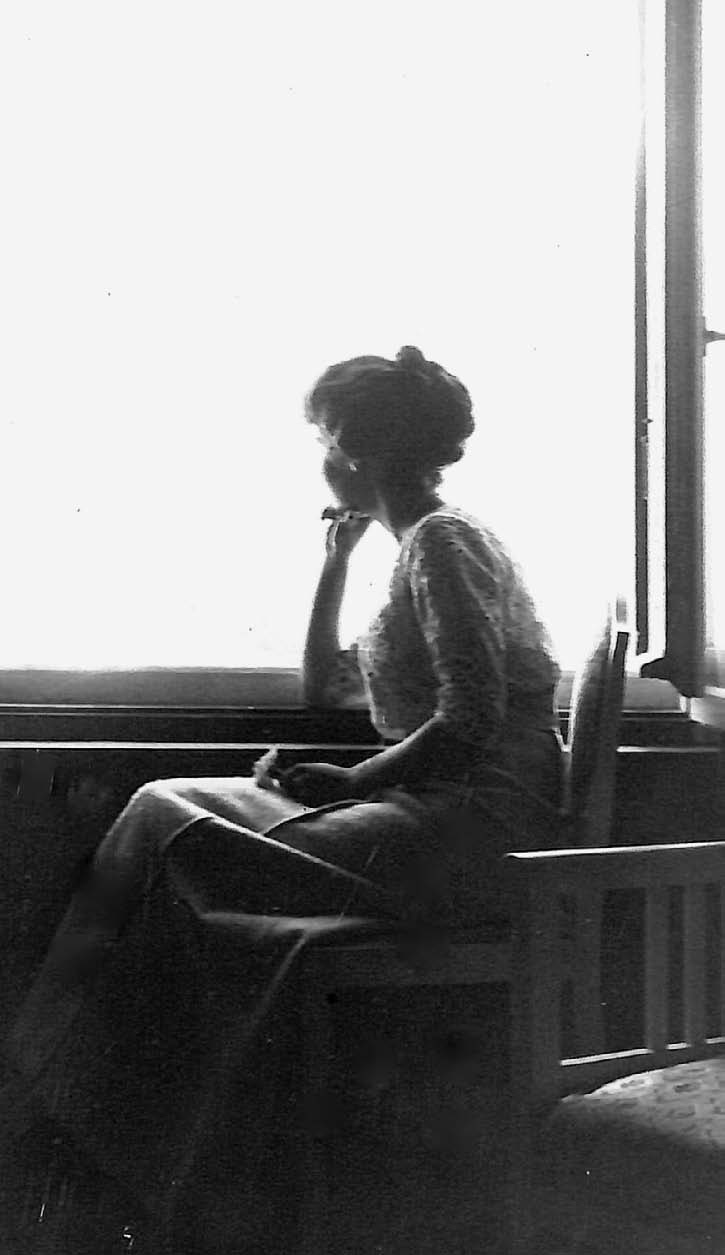Canadian Store (CAD)
You are currently shopping in our Canadian store. For orders outside of Canada, please switch to our international store. International and US orders are billed in US dollars.
If you are looking for a fascinating biography to curl up with over the holidays, An American Princess: The Remarkable Life of Marguerite Chapin Caetani is a great pick!
In An American Princess, Laurie Dennett relates the remarkable story of a New England woman whose wealth, intelligence, and charm took her to the heart of aristocratic and intellectual Europe. Marguerite Chapin (1880-1963) was the product of two cultures: her father’s enterprising American one and her mother’s French heritage, which enabled her to move to Paris when she inherited a fortune at age twenty-one. The biography recounts Marguerite’s remarkable life, and how this young New Englander became a princess, made literary history, and helped create Italy’s most romantic garden.
The following excerpt is taken from chapter 8 of An American Princess. The excerpt opens with Marguerite’s connection to Rainer Marie Rilke and illustrates the network of writers she published in her literary review Commerce.
On 7 January 1925, the Austrian poet Rainer Marie Rilke returned to Paris for the first time in five years. He had recently emerged from a Swiss clinic, where treatment for a mysteriously recurring, debilitating illness had seemingly restored him to health, and was eager to reconnect with literary friends in the French capital. Paul Valéry was the first of these to seek him out at his lodgings at the Hôtel Foyot, near the Luxembourg Gardens. A few months earlier, Valéry had asked Rilke for prose or poetry that might be suitable for Commerce, and a poem entitled “La Dormeuse” was one of those Rilke had sent him. When Valéry visited him in Paris, he brought along copies of the second number of Commerce (autumn 1924), in which the poem appeared. Rilke was impressed by the review, and on 5 February he was invited to lunch to meet its moving spirits. He already knew fellow poet Léon-Paul Fargue, and was especially glad to find himself seated next to the diplomat Alexis Léger, whose work he admired. It was Marguerite’s conversation , however, that captivated him, and led him to write appreciatively to her on the following day: “Yesterday’s lunch was charming, with its spontaneous closeness…and I admired your stroke of genius in suggesting to us all those topics for activities and intellectual pastimes whose importance surpassed the delights of the moment.”
, however, that captivated him, and led him to write appreciatively to her on the following day: “Yesterday’s lunch was charming, with its spontaneous closeness…and I admired your stroke of genius in suggesting to us all those topics for activities and intellectual pastimes whose importance surpassed the delights of the moment.”
Marguerite responded by sending him a German translation of a satirical work by Denis Diderot, and Rilke, when invited to Villa Romaine ten days later, presented her with a copy of his novel, The Notebooks of Malte Laurids Brigge, and of the recently completed Sonnets to Orpheus and Duino Elegies (inscribed with a dedication to her as “animatrice de nos meilleurs efforts et protectrice des afinitées”). Rilke was proud of his ability to produce poetry in French as well as German, and into the copy of the Duino Elegies he slipped such a poem, written especially for Marguerite.
This gracious touch sealed a friendship that lasted the remaining twenty months of the poet’s life, though neither he nor his friends had any idea that the time remaining to him would be so short. He and Marguerite corresponded often, always in French, to discuss what they were reading, or some matter related to Commerce. She for him was “Ma chère Princesse,” while she, in the large, dashing handwriting that often lacked the necessary accents, was soon addressing him as “Très cher Ami,” or “Très cher Ami et Grand Poête.” While he remained in Paris, he was frequently the guest of the Caetanis for lunch, whether in town or in the more intimate setting of Villa Romaine, but it was never a one sided friendship. When, for instance, Léon-Paul Fargue let Marguerite down by not producing a piece he had promised for Commerce, it was Rilke who supplied a text at short notice. He provided Marguerite with tickets to what he considered an outstanding marionette show, to which, one imagines, he thought she should take the children. He also did Roffredo the favour of looking over the German translation of the libretto of Hypatia, an invaluable service in light of the probability that the opera would be produced first in that language. This was a true friendship, too, in that Marguerite respected Rilke’s well-known resistance to any kind of commitment. When she invited him to become an official correspondent for Commerce, it was with no sense that he should feel obliged, for friendship’s sake, to accept. He in turn declined, freely expressing his reservations about the responsibilities such a position might require of him.
Still, it was not only her hospitality, but also Marguerite’s sensitivity and gift for friendship that would be recalled by many writers. Her relationship with Rilke, so short in chronological terms, was no exception in being rich in thoughtful gestures. In April 1925, for example, when the poet was confined to bed with influenza, Marguerite sent a nurse who had just spent a few weeks at Villa Romaine to look after him at the Hôtel Foyot, and to report to her anything he needed. While such attention to his physical well-being was appreciated, Rilke was even more deeply touched by her generosity where his poetic imagination was concerned. One Sunday at Villa Romaine, he and Jean Paulhan leafed through a folio edition of William Blake’s drawings and engravings – Blake being an author and artist greatly esteemed by Marguerite and Roffredo. When Rilke wrote a day or so later to ask, hesitantly, if he might borrow “the precious volume … almost a piece of furniture … that immense volume (immense for its content too)” for a few days, Marguerite replied by packing it up and sending it, via Paulhan, to Rilke’s hotel. In the note accompanying it, she wrote, “I am happy that you asked me for it. Blake will be even more precious and dear to me, crowned with your praise.”
Later, with the vast tome open before him, Rilke confided to Marguerite his conviction that it was not mere chance that had led to this auspicious re-encounter with Blake’s illustrations, some of which had for him “the force of revelation.” They were consummate works of the imagination that stirred his own:
I have always measured the success of a work of art by its ability
to embody not only certain objects and figures from the inside,
but by its ability to render at the same time the reality of this
imaginary space that contains them inside us, this space being
infinitely and subtly different from the other external space.
From this point of view: what an unrivalled world of the soul,
what distances of the spirit there are in these outpourings that
make use of drawing to arrive directly at a pure, simultaneous,
and perceptible music.

A typically elusive pose: Marguerite seated at her hotel room window, Sils Maria, summer 1908.
Through Rilke, Marguerite and Roffredo met his companion, the artist Baladine Klossowska, whose younger son, Balthasar, grew up to become the enigmatic painter Balthus, and a friend of the Caetanis in his own right. Rilke very likely also introduced Marguerite to the Austrian novelist and poet Hugo von Hofmannsthal, who arrived in Paris in January 1925 to visit his daughter, Christiane. Like Rilke, Christiane was staying at the Hôtel Foyot, and on 25 February Marguerite and Roffredo invited Rilke and the hofmannsthals to lunch in the hotel’s restaurant.
Marguerite exchanged letters with Hofmannsthal until his death in 1929, and two pieces by him appeared in Commerce. While Marguerite’s friendship with him was intensely literary, it came to include his whole family. It was also helpful to Roffredo, since Hofmannsthal had written the libretti for no less than six of the operas of Richard Strauss, and with Strauss and the playwright Max Reinhardt, had founded the Salzburg Music Festival in 1920. Roffredo sent him the German text of Hypatia, and in early May 1925, while on a trip to further the production of the opera the following year, visited him at his home near Vienna. Later he wrote an account of the visit to Marguerite:
I lunched with the Hofmannsthals in their small country house in
Rodaun. – They were most sympathetic – so simple and sincere.
He has read very carefully the libretto of Hypatia and told me
things which gave me a great pleasure … The Hofmannsthals
are very poor having been ruined by the war. – The daughter is
living on nothing, we’ll have to help her.
Marguerite and Roffredo duly befriended Christiane, inviting her to stay at Villa Romaine on several occasions, and Marguerite sent her books and articles of clothing. The Hofmannsthals, father and daughter, returned to Paris to attend a special event organized by Marguerite at Villa Romaine on Saturday, 23 May: a performance of excerpts from Hypatia, given by five soloists, before a select audience of twenty that included Rilke, Valéry, Larbaud, Fargue, and Paulhan, and patrons of the Parisian musical scene such as Count Boni de Castellane and the Princesse de Polignac. After this occasion, Hofmannsthal wrote to his wife, Gerty, concerning Marguerite, that “she is such a delightful woman, it’s so easy to have fun with her. She can’t be much younger than you (with Americans it’s hard to tell) but she gives the impression of being young.” Hofmannsthal’s efforts to promote the production of Hypatia were appreciated, and while they lived in Versailles, Marguerite and Roffredo supported their friend’s involvement with the Salzburg Festival by attending it and inviting friends to join them every August. Marguerite also made a point of introducing Hofmannsthal to writers he wanted to meet, such as Paul Claudel (even if he did not, as in that instance, end up liking them very much). In contrast, to Marguerite herself Hofmannsthal penned the following tribute, in a letter of 2 July 1925:
It is an exquisite pleasure to think of you. You surround yourself
with poets and artists, and the air around you remains very pure
and very clear, with no shadow of snobbishness. You talk to dogs
as one should talk to dogs, you talk to plants as it is fitting to talk
to plants, you talk to poets as one should talk to poets – and you
remain yourself, of an unfailing grace. You are admirable.
Learn more about An American Princess: The Remarkable Life of Marguerite Chapin Caetani
 back to all news
back to all news
No comments yet.